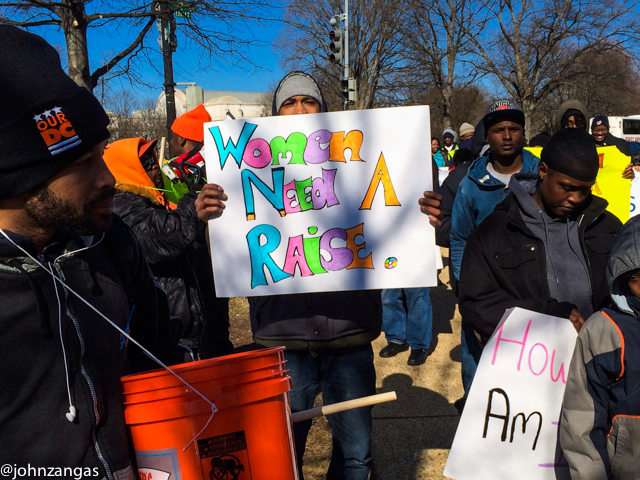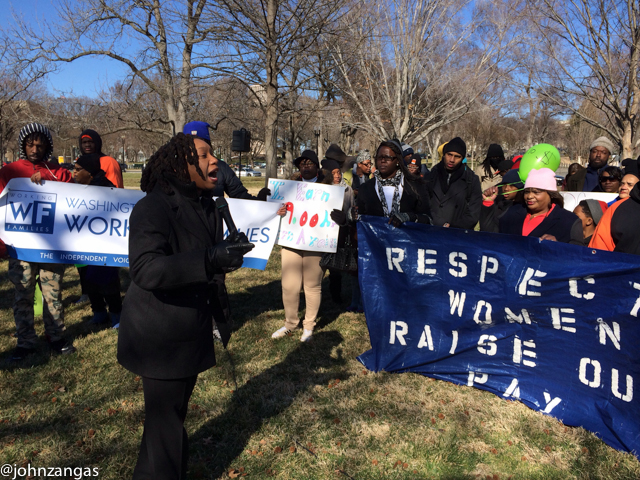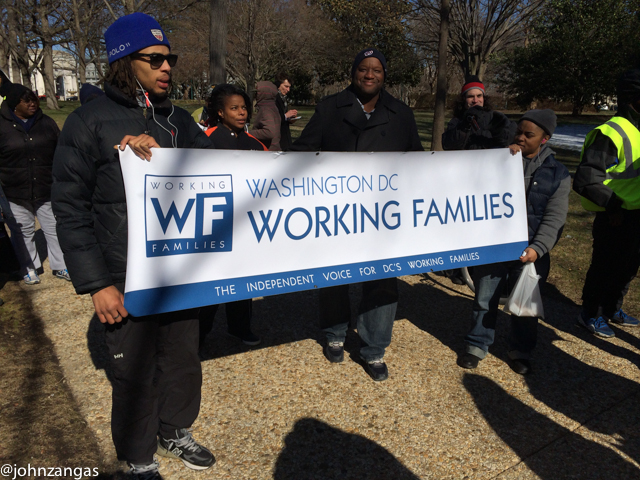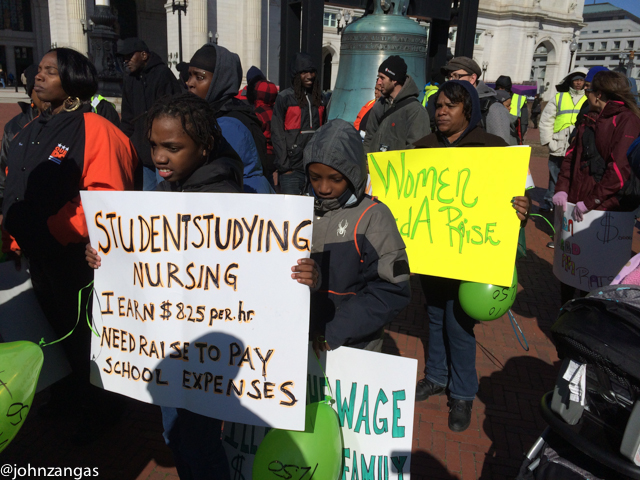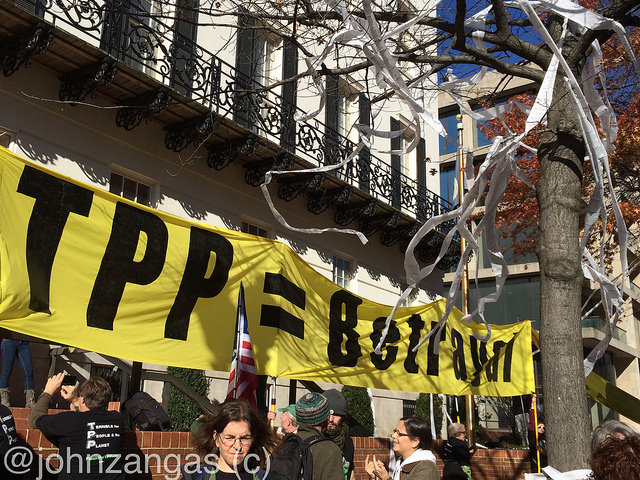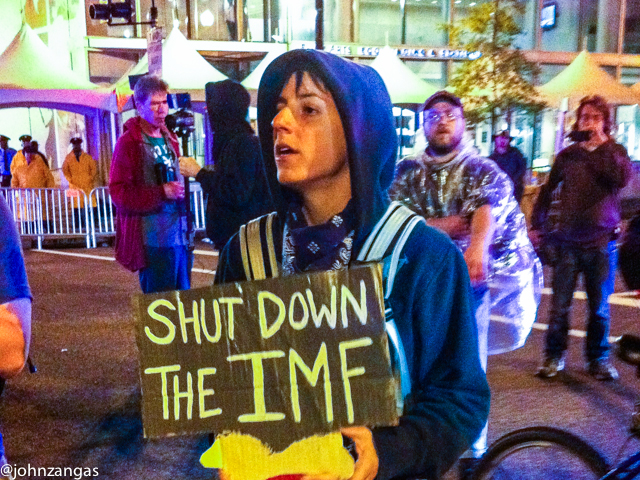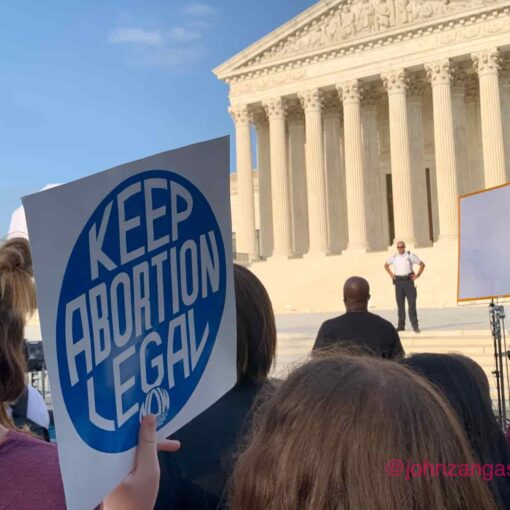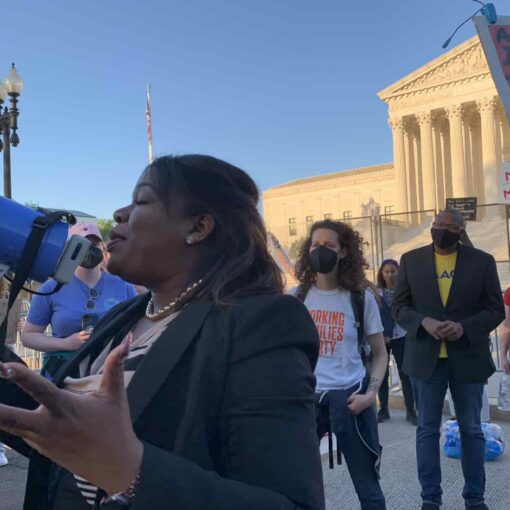Nearly a hundred people associated with labor advocacy groups Working Families of DC and Our DC rallied at Union Station, then marched to the U.S. Capitol on March 27 in support of living wages for struggling families in the District. They demanded that Mayor Vincent Gray approve a living wage of $12.50 per hour for DC residents making at or near “poverty wages” of $8.25 per hour. The current federal minimum wage is $7.25 per hour.
A living wage is the amount if money a person needs to earn in a standard 40 hour work week in order to maintain a normal standard of living in a local economy.
“Most of the people here today are from Wards 7 and 8, which has the highest rate of poverty in DC,” said Travis Dupree, spokesman for Our DC. “People are here today to support women who make 65% of the minimum wage workforce.”
“The wages of women trail behind men terribly, and we know that women tend to be at higher levels of poverty,” said Reverend Sekinah Hamlin, Director of Ecumenical Poverty Initiative, who spoke at the rally. “We want the [minimum] wage to be raised to $12.50 in DC because we know that DC has a higher cost of living.”
But Delvone Michael, Director of DC Working Families, believes that a minimum wage of $12.50 is not enough. “$12.50 is the floor, it should be more,” he said. “I find it hard to believe that there are officials that think what they’ve done is adequate.” DC Working Families has been working to get signatures necessary to include the minimum wage target increase on the ballot this year. They also want tipped workers to get a wage increase to $8.70 per hour. Restaurant servers in Washington DC are paid $2.77 per hour, about one-third the minimum wage.
A living wage bill targeting big box retail stores in the District was defeated last year. Walmart threatened not to open three stores if a $12.50 living wage was approved. City Council eventually agreed to raise the minimum wage to $11.50 per hour, but it does not take effect until 2016.
But a raise of the minimum wage to $11.50 is still over two dollars short of what a single person needs to survive today in the local DC economy, according to a MIT wage tracker. Based on costs of food, rent, utilities, child care, and other living costs, a single person needs to make $13.67 per hour at a minimum. For a family of two, one adult and one child, it is $26.35.
“To me their message is, we really don’t want you here if they’re not willing to pay people more to live here,” said Michael, who took issue with City Council’s failed efforts last year to give DC residents a living wage. “At some point if it continues to go this way it’s going to be all our workers are bussed in to work and then go home.” Michael believes the increasing costs of rent and food are some of the reasons DC is unaffordable for those paid little more than minimum wage. “A lot of folks are having to leave the district,” he said. “Every time a building goes up there’s one- or two-bedroom condominiums for a minimum of $2,100 [per month], not three or four bedroom houses.”
The federal minimum wage has not kept pace with inflation, worker productivity or improvements in technology, according to a study released in March by the Center for Economic and Policy Research. If it had, it would be $21.72 per hour, according to the study, nearly three times the present wage.
In January, President Obama signed an executive order raising wages of all federal contract workers to the minimum of $10.10 per hour, effective at the beginning of 2015.
“We’ve seen that our president has raised to wages of federal contract workers, and so this is our time, this is our moment to seize that,” said Hamlin.
Despite setbacks to attain a District wide living wage, Michael is not discouraged and plans to continue fighting. “We have to organize block by block and ward by ward,” said Michael. “The only power we have is the power of the ballot.”

